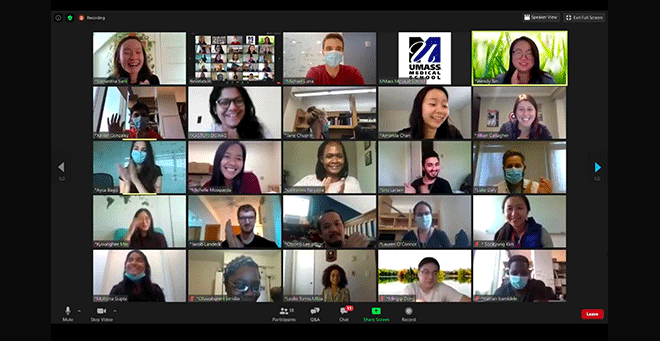 |
In a year when education rituals were up-ended by the COVID-19 pandemic, 56 Graduate School of Biomedical Sciences doctoral candidates were honored virtually in a qualifying exam recognition ceremony streamed over Zoom and on Facebook Live on Monday, Sept. 14.
“This is the essential milestone that our community has chosen to celebrate, as it marks the successful transition from student to scholar,” said GSBS Dean Mary Ellen Lane.
Passing the qualifying exam is a significant milestone for PhD students, marking their transition from classroom-based learning to dissertation research as formal candidates for doctoral degrees.
Despite the new format, the traditions and values shared in the recognition ceremony remained strong.
The newest doctoral candidates were symbolically, if not yet directly, given engraved laser pointers and business cards, a tradition dating to 2013.
Dean Lane explained the significance of these items instead of a lab coat.
“The symbolic value of the laser pointer derives from its use in one of the essential components of scholarship, namely the dissemination of knowledge,” she said.
“And while the culture of business card exchange varies with field and venue, the cards themselves are an explicit symbol of your identity as an emerging scholar and your affiliation with one of the best biomedical research institutions in the world.”
Further, she added, a lab coat would not be an inclusive symbol for the GSBS community because not everyone works in a lab.
“We all had an involuntary lesson in the importance of work done outside of the laboratory this spring,” she said. “And even now that those of you who work in labs are back on site, the distancing requirements and safety standards that we will be adhering to for the foreseeable future are profoundly changing the culture of scientific work.”
Lane recounted how operating differently has brought about adaptation that, while stressful at times, would improve the practice of science, from creating new academic testing formats, to working more efficiently, to being innovative in fostering inclusion and connection, to sharing data with unprecedented speed.
“Not all of us are working directly on understanding or mitigating the pandemic,” she said, “but this foundational shift in the manner and the pace at which scientific information is shared, validated and ultimately established as scientific fact will reverberate in all areas of investigation.”
She called on the doctoral candidates to remember their public obligation to not only add content to the body of scientific knowledge, but like the laser pointers that bear their names, to also illuminate.
Chancellor Michael F. Collins and Executive Deputy Chancellor, Provost and School of Medicine Dean Terence R. Flotte also emphasized the importance of civic engagement among scientists.
“Each of you represents rays of hope and streaks of promise,” Chancellor Collins said. “Now more than ever we need fact, not fiction; we need hope, not hate; we need science, not sensationalism.”
Dean Flotte called on the doctoral candidates to stay true to the principles of science in turbulent times: “That is the essence of your commitment to science: to follow the data; to commit to the truth that the data reveals, no matter where it may lead you.”
Watch a full video of the ceremony here.
The Graduate School of Biomedical Sciences recognized the following students who were admitted to doctoral candidacy in academic year 2019/2020:
Emily Agnello, Brian Kelch Lab
Adediwura Arowosegbe, Jennifer Wang Lab
Ayca Bagci, Phillip Zamore Lab
Alexander S. Baier, Craig Peterson Lab
Nathan Bamidele, Erik Sontheimer Lab
Kasturi Biswas, Michael Francis Lab
Amanda Chan, Kenneth Rock Lab
Jane Evelyn Chuprin, Michael Green and Michael Brehm Labs
Luke Daly, Fen-Biao Gao and Paul Greer Labs
Janneke Doedee Icso, Paul Thompson Lab
Mingqi Dong, Kate Fitzgerald Lab
Oluwabunmi M. Emidio, MD, MPH, Stephenie Lemon Lab
Jill Gallagher, Heather Gray-Edwards Lab
Xavier Gonzalez, Javier Irazoqui Lab
Khusali Gupta, Jeanne Lawrence Lab
Mohona Gupta, Hemant Khanna Lab
John Haley, David Guertin Lab
Adam Hedger, Jonathan Watts and Celia Schiffer Labs
Samuel Hildebrand, Anastasia Khvorova Lab
Bao Ho, Neal Silverman Lab
Wenjia Huang, Alexandra Byrne Lab
Erica Katz, John Harris Lab
Sookyung Kim, Cole Haynes Lab
Denis Lafontaine, Job Dekker Lab
Jacob Landeck, Brian Kelch Lab
Eric Larsen, Jeanne Lawrence and Oliver King Labs
Heather Learnard, Fen-Biao Gao Lab
Chrono Lee, Stuart Levitz Lab
Silviana Lee, Sharon Cantor Lab
Sun-Young Lim, Jennifer Wang and Robert Finberg Labs
Xingchen Liu, Brian Kelch Lab
Michael Luna, Christopher Sassetti Lab
Hannah Joy MacMillan, Athma Pai Lab
Kyounghee Min, Michael Czech Lab
Katherine Mocarski, Paul Greer and Robert Brown Labs
Michelle Mosqueda, Francesca Massi Lab
Dimpi Mukhopadhyay, Arthur Mercurio Lab
Catherine S. Nagawa, Rajani Sadasivam Lab
Mohamad A. Nasrallah, Joel Richter Lab
Lauren O'Connor, Alexandra Byrne Lab
Sabine Pallat, Kensuke Futai and Douglas Golenbock Labs
Karthikeyan Ponnienselvan, Scot Wolfe Lab
Tasfia Rakib, Samuel Behar Lab
Samantha Sarli, Jonathan Watts Lab
Shuo Shan, Zhiping Weng Lab
Anya Song, Dorothy Schafer Lab
Wendy Tan, Craig Mello Lab
Leslie Torres Ulloa, Athma Pai Lab
Kaitlyn Valla, Jonathan Watts Lab
Christofer Welsh, Amy Walker Lab
Tianyi Ye, Michael Green Lab
Han Zhang, Erik Sontheimer Lab
Four qualifying students who did not participate in the ceremony are:
Gregory Andrews, Zhiping Weng Lab
Shaimae Elhajjajy, Zhiping Weng Lab
Yuqing Wang, Manuel Garber Lab
Zinger Yang, Silvia Corvera Lab